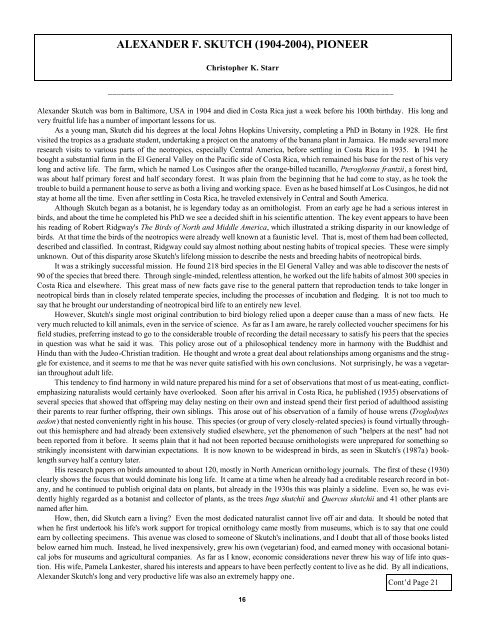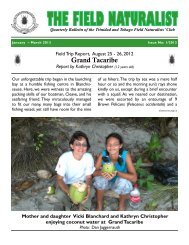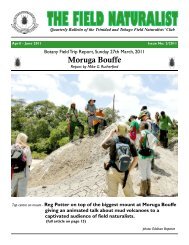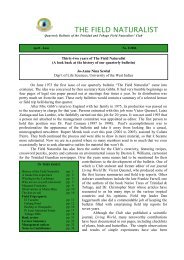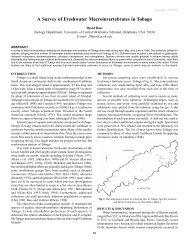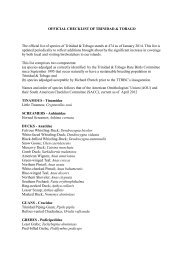Vol 2 - The Trinidad and Tobago Field Naturalists' Club
Vol 2 - The Trinidad and Tobago Field Naturalists' Club
Vol 2 - The Trinidad and Tobago Field Naturalists' Club
Create successful ePaper yourself
Turn your PDF publications into a flip-book with our unique Google optimized e-Paper software.
ALEXANDER F. SKUTCH (1904-2004), PIONEERChristopher K. Starr__________________________________________________________________Alex<strong>and</strong>er Skutch was born in Baltimore, USA in 1904 <strong>and</strong> died in Costa Rica just a week before his 100th birthday. His long <strong>and</strong>very fruitful life has a number of important lessons for us.As a young man, Skutch did his degrees at the local Johns Hopkins University, completing a PhD in Botany in 1928. He firstvisited the tropics as a graduate student, undertaking a project on the anatomy of the banana plant in Jamaica. He made several moreresearch visits to various parts of the neotropics, especially Central America, before settling in Costa Rica in 1935. In 1941 hebought a substantial farm in the El General Valley on the Pacific side of Costa Rica, which remained his base for the rest of his verylong <strong>and</strong> active life. <strong>The</strong> farm, which he named Los Cusingos after the orange-billed tucanillo, Pteroglossus frantzii, a forest bird,was about half primary forest <strong>and</strong> half secondary forest. It was plain from the beginning that he had come to stay, as he took thetrouble to build a permanent house to serve as both a living <strong>and</strong> working space. Even as he based himself at Los Cusingos, he did notstay at home all the time. Even after settling in Costa Rica, he traveled extensively in Central <strong>and</strong> South America.Although Skutch began as a botanist, he is legendary today as an ornithologist. From an early age he had a serious interest inbirds, <strong>and</strong> about the time he completed his PhD we see a decided shift in his scientific attention. <strong>The</strong> key event appears to have beenhis reading of Robert Ridgway's <strong>The</strong> Birds of North <strong>and</strong> Middle America, which illustrated a striking disparity in our knowledge ofbirds. At that time the birds of the neotropics were already well known at a faunistic level. That is, most of them had been collected,described <strong>and</strong> classified. In contrast, Ridgway could say almost nothing about nesting habits of tropical species. <strong>The</strong>se were simplyunknown. Out of this disparity arose Skutch's lifelong mission to describe the nests <strong>and</strong> breeding habits of neotropical birds.It was a strikingly successful mission. He found 218 bird species in the El General Valley <strong>and</strong> was able to discover the nests of90 of the species that breed there. Through single-minded, relentless attention, he worked out the life habits of almost 300 species inCosta Rica <strong>and</strong> elsewhere. This great mass of new facts gave rise to the general pattern that reproduction tends to take longer inneotropical birds than in closely related temperate species, including the processes of incubation <strong>and</strong> fledging. It is not too much tosay that he brought our underst<strong>and</strong>ing of neotropical bird life to an entirely new level.However, Skutch's single most original contribution to bird biology relied upon a deeper cause than a mass of new facts. Hevery much relucted to kill animals, even in the service of science. As far as I am aware, he rarely collected voucher specimens for hisfield studies, preferring instead to go to the considerable trouble of recording the detail necessary to satisfy his peers that the speciesin question was what he said it was. This policy arose out of a philosophical tendency more in harmony with the Buddhist <strong>and</strong>Hindu than with the Judeo-Christian tradition. He thought <strong>and</strong> wrote a great deal about relationships among organisms <strong>and</strong> the strugglefor existence, <strong>and</strong> it seems to me that he was never quite satisfied with his own conclusions. Not surprisingly, he was a vegetarianthroughout adult life.This tendency to find harmony in wild nature prepared his mind for a set of observations that most of us meat-eating, conflictemphasizingnaturalists would certainly have overlooked. Soon after his arrival in Costa Rica, he published (1935) observations ofseveral species that showed that offspring may delay nesting on their own <strong>and</strong> instead spend their first period of adulthood assistingtheir parents to rear further offspring, their own siblings. This arose out of his observation of a family of house wrens (Troglodytesaedon) that nested conveniently right in his house. This species (or group of very closely-related species) is found virtually throughoutthis hemisphere <strong>and</strong> had already been extensively studied elsewhere, yet the phenomenon of such "helpers at the nest" had notbeen reported from it before. It seems plain that it had not been reported because ornithologists were unprepared for something sostrikingly inconsistent with darwinian expectations. It is now known to be widespread in birds, as seen in Skutch's (1987a) booklengthsurvey half a century later.His research papers on birds amounted to about 120, mostly in North American ornithology journals. <strong>The</strong> first of these (1930)clearly shows the focus that would dominate his long life. It came at a time when he already had a creditable research record in botany,<strong>and</strong> he continued to publish original data on plants, but already in the 1930s this was plainly a sideline. Even so, he was evidentlyhighly regarded as a botanist <strong>and</strong> collector of plants, as the trees Inga skutchii <strong>and</strong> Quercus skutchii <strong>and</strong> 41 other plants arenamed after him.How, then, did Skutch earn a living? Even the most dedicated naturalist cannot live off air <strong>and</strong> data. It should be noted thatwhen he first undertook his life's work support for tropical ornithology came mostly from museums, which is to say that one couldearn by collecting specimens. This avenue was closed to someone of Skutch's inclinations, <strong>and</strong> I doubt that all of those books listedbelow earned him much. Instead, he lived inexpensively, grew his own (vegetarian) food, <strong>and</strong> earned money with occasional botanicaljobs for museums <strong>and</strong> agricultural companies. As far as I know, economic considerations never threw his way of life into question.His wife, Pamela Lankester, shared his interests <strong>and</strong> appears to have been perfectly content to live as he did. By all indications,Alex<strong>and</strong>er Skutch's long <strong>and</strong> very productive life was also an extremely happy one.Cont’d Page 2116


